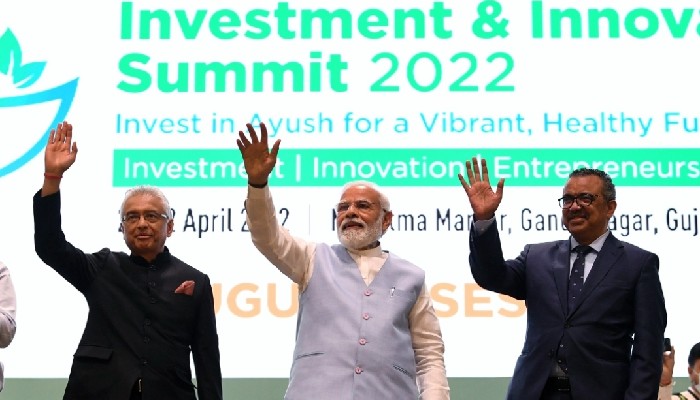Kerala leads the list of Top 5 states on SDGs 2020-21; Bihar has the lowest score
India’s overall Sustainable Development Goals (SDG) score has improved riding on the positive stride towards achieving the targets.
The country’s overall SDG score improved by 6 points—from 60 in 2019 to 66 in 2020–21, according to the the 3rd edition of the SDG India Index and Dashboard 2020–21 released by NITI Aayog on Thursday.
This is largely driven by exemplary country-wide performance in Goal 6 (Clean Water and Sanitation) and Goal 7 (Affordable and Clean Energy).
The composite scores for Goal 6 and Goal 7 are 83 and 92 respectively.
Kerala leads the list of Top 5 states on SDGs 2020-21; Bihar has the lowest score.
The SDG India Index 2020–21, developed in collaboration with the United Nations in India, tracks progress of all States and UTs on 115 indicators that are aligned to MoSPI’s National Indicator Framework (NIF).
According to the findings of the report, Kerala leads the list of Top 5 states on SDGs 2020-21 with 75 points.
It is followed by Himachal Pradesh and Tamil Nadu with 74 each; Andhra Pradesh, Karnataka, Goa and Uttarakhand with 72; Sikkim with 71 points and Maharashtra with 70 points.
The Bottom 5 states include Chandigarh, Nagaland, Odisha (61 points); Arunachal Pradesh, Meghalaya, Rajasthan, Uttar Pradesh (60 points; Assam(57); Jharkhand.(56) and Bihar (52 points).
The states of Mizoram, Haryana, and Uttarakhand are the top gainers in 2020–21 in terms of improvement in score from 2019, with an increase of 12, 10 and 8 points, respectively.
While in 2019, 10 States/UTs belonged to the category of Front-Runners (score in the range 65–99, including both) 12 more States/UTs find themselves in this category in 2020–21.
According to the 2020-21 assessment, Uttarakhand, Gujarat, Maharashtra, Mizoram, Punjab, Haryana, Tripura, Delhi, Lakshadweep, Andaman and Nicobar Islands, Jammu and Kashmir and Ladakh graduated to the category of Front-Runners.
Since its inaugural launch in 2018, the index has been comprehensively documenting and ranking the progress made by States and Union Territories towards achieving the Sustainable Development Goals.
Now in its third year, the index has become the primary tool for monitoring progress on the SDGs in the country and has simultaneously fostered competition among the States and Union Territories.
Designed and developed by NITI Aayog, the preparation of the index followed extensive consultations with the primary stakeholders—the States and Union Territories; the UN agencies led by United Nations in India; Ministry of Statistics and Programme Implementation (MoSPI), and the key Union Ministries.
“Our effort of monitoring SDGs through the SDG India Index & Dashboard continues to be widely noticed and applauded around the world. It remains a rare data-driven initiative to rank our States and Union Territories by computing a composite index on the SDGs,” said Niti Aayog’s Vice-Chairperson Rajiv Kumar.
“We are confident that it will remain a matter of aspiration and emulation and help propel monitoring efforts at the international level,” he added.
With one-third of the journey towards achieving the 2030 Agenda behind us, this edition of the index report focuses on the significance of partnerships as its theme.
“The report reflects on the partnerships we have built and strengthened during our SDG efforts. The narrative throws light on how collaborative initiatives can result in better outcomes and greater impacts,” said Amitabh Kant, CEO, NITI Aayog.
On the theme of partnerships which is central to Goal 17, Vinod Paul, Member (Health), NITI Aayog, said, “It is clear that by working together we can build a more resilient and sustainable future, where no one is left behind.”
“From covering 13 Goals with 62 indicators in its first edition in 2018, the third edition covers 16 Goals on 115 quantitative indicators, with a qualitative assessment on Goal 17, thereby reflecting our continuous efforts towards refining this important tool,” said Sanyukta Samaddar, Adviser (SDGs), NITI Aayog.
NITI Aayog has the twin mandate to oversee the adoption and monitoring of the SDGs in the country, and also promote competitive and cooperative federalism among States and UTs.
The index represents the articulation of the comprehensive nature of the Global Goals under the 2030 Agenda while being attuned to the national priorities.
The modular nature of the index has become a policy tool and a ready reckoner for gauging progress of States and UTs on the expansive nature of the Goals, including health, education, gender, economic growth, institutions, climate change and environment.
 Contact Us
Contact Us  Subscribe Us
Subscribe Us









 Contact Us
Contact Us
 Subscribe
Subscribe
 News Letter
News Letter

